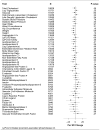Causal Assessment of Serum Urate Levels in Cardiometabolic Diseases Through a Mendelian Randomization Study
- PMID: 26821629
- PMCID: PMC5503188
- DOI: 10.1016/j.jacc.2015.10.086
Causal Assessment of Serum Urate Levels in Cardiometabolic Diseases Through a Mendelian Randomization Study
Abstract
Background: Although epidemiological studies have reported positive associations between circulating urate levels and cardiometabolic diseases, causality remains uncertain.
Objectives: Through a Mendelian randomization approach, we assessed whether serum urate levels are causally relevant in type 2 diabetes mellitus (T2DM), coronary heart disease (CHD), ischemic stroke, and heart failure (HF).
Methods: This study investigated 28 single nucleotide polymorphisms known to regulate serum urate levels in association with various vascular and nonvascular risk factors to assess pleiotropy. To limit genetic confounding, 14 single nucleotide polymorphisms exclusively associated with serum urate levels were used in a genetic risk score to assess associations with the following cardiometabolic diseases (cases/controls): T2DM (26,488/83,964), CHD (54,501/68,275), ischemic stroke (14,779/67,312), and HF (4,526/18,400). As a positive control, this study also investigated our genetic instrument in 3,151 gout cases and 68,350 controls.
Results: Serum urate levels, increased by 1 SD due to the genetic score, were not associated with T2DM, CHD, ischemic stroke, or HF. These results were in contrast with previous prospective studies that did observe increased risks of these 4 cardiometabolic diseases for an equivalent increase in circulating urate levels. However, a 1 SD increase in serum urate levels due to the genetic score was associated with increased risk of gout (odds ratio: 5.84; 95% confidence interval: 4.56 to 7.49), which was directionally consistent with previous observations.
Conclusions: Evidence from this study does not support a causal role of circulating serum urate levels in T2DM, CHD, ischemic stroke, or HF. Decreasing serum urate levels may not translate into risk reductions for cardiometabolic conditions.
Keywords: genetic; pleiotropy; single nucleotide polymorphism.
Copyright © 2016 American College of Cardiology Foundation. Published by Elsevier Inc. All rights reserved.
Figures




Comment in
-
Genetic Causality in Complex Traits: The Case of Uric Acid.J Am Coll Cardiol. 2016 Feb 2;67(4):417-419. doi: 10.1016/j.jacc.2015.09.109. J Am Coll Cardiol. 2016. PMID: 26821630 No abstract available.
-
Serum uric acid levels and cardiovascular disease: the Gordian knot.J Thorac Dis. 2016 Nov;8(11):E1462-E1466. doi: 10.21037/jtd.2016.11.39. J Thorac Dis. 2016. PMID: 28066631 Free PMC article.
References
Publication types
MeSH terms
Substances
Grants and funding
- R01 NS017950/NS/NINDS NIH HHS/United States
- RG/13/13/30194/BHF_/British Heart Foundation/United Kingdom
- RG/08/014/24067/BHF_/British Heart Foundation/United Kingdom
- RC2 HL101834/HL/NHLBI NIH HHS/United States
- R01 DK101478/DK/NIDDK NIH HHS/United States
- FS/14/55/30806/BHF_/British Heart Foundation/United Kingdom
- WT_/Wellcome Trust/United Kingdom
- RC1 TW008485/TW/FIC NIH HHS/United States
- R21 NS064908/NS/NINDS NIH HHS/United States
- U54 RR020278/RR/NCRR NIH HHS/United States
- R01 HL087676/HL/NHLBI NIH HHS/United States
- U01 HL096917/HL/NHLBI NIH HHS/United States
- MR/L003120/1/MRC_/Medical Research Council/United Kingdom
- R01 HL093029/HL/NHLBI NIH HHS/United States
- N01 HC025195/HL/NHLBI NIH HHS/United States
- R01 AG033193/AG/NIA NIH HHS/United States
- U01 NS069208/NS/NINDS NIH HHS/United States
LinkOut - more resources
Full Text Sources
Other Literature Sources
Medical
Research Materials
Miscellaneous

